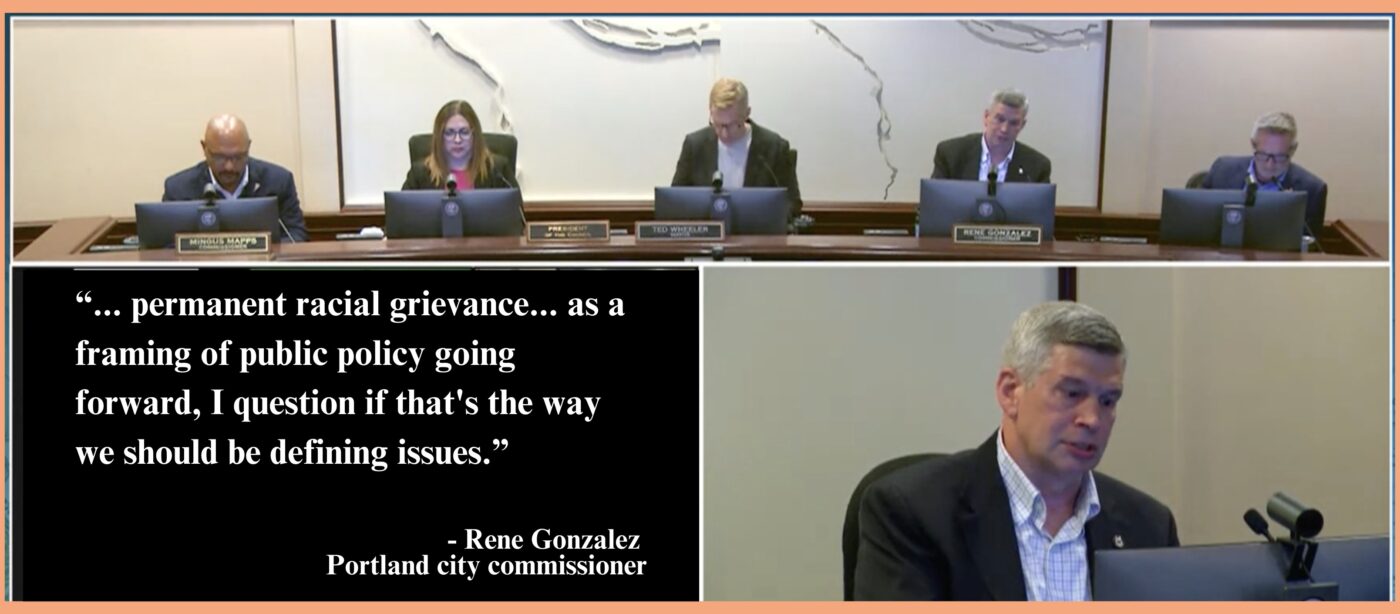Portland City Council passed a landmark climate change investment on Wednesday when they voted unanimously in support of the $750 million, Portland Clean Energy Fund (PCEF) five-year spending plan.
As I shared yesterday, at least $80 million of that fund will support bicycling and other transportation programs and projects that encourage people to drive less. $25 million of it will go directly to the Portland Bureau of Transportation to boost an existing program that provides free bus, BikeTown, scooter, and taxi rides. Strangely, PBOT Commissioner Mingus Mapps — who just 24 hours ago laid out the most bleak transportation budget in the history of Portland — was the only person on council to not make a statement to mark the historic occasion.
But while Mapps’ silence was notable, it was the statement from Commissioner Rene Gonzalez that really stood out.
Before voting yes on the measure, Gonzalez shared several “deep concerns” with the plan.
(Listen to audio of Gonzalez’s remarks below.)
Gonzalez expressed shade at the carefully-vetted plan, a plan that went through months of careful outreach to thousands of Portlanders and was rigorously vetted by a nine-member committee made up of climate experts, business owners, community leaders, and academics. Without any evidence or explanation to back it up, Gonzalez said he had “concerns” and “real questions” about whether the investment would “truly push for decarbonization.”
Dismissive, condescending comments like this erode public trust in city government and depress civic engagement when we need it most. They also typify the, I-know-better-than-you-because-I’m-up-here-and-you’re-down-there mentality from some elected officials that Portlanders are eager to jettison when they vote for a new slate of councilors next year.
Then Gonzalez said, “Deeply embedded in this ordinance is permanent racial grievance… and as a framing of public policy going forward, I question if that’s the way we should be defining issues.”
That was a very surprising thing for a councilor to say, given that this PCEF plan tracks very closely to many existing City of Portland policies and a deep body of public health research. He also refuted something that, while it’s clearly uncomfortable for him personally, also happens to be a fact. Racism has underpinned much of the planning and infrastructure investments throughout Portland’s history.
Gonzalez has only been on council for 10 months, so perhaps he’s unaware that the Portland Bureau of Planning & Sustainability (the bureau that oversees PCEF) has documented this racism and that PBOT’s current strategic plan includes “Will it address structural racism?” as one of the two questions it asks before making decisions.
The 2019 BPS publication, Historical Context of Racist Planning: A history of how planning segregated Portland is just the tip of the iceberg. From the “urban renewal” policies and highways that decimated lower Albina and south Portland, to the flooding of Vanport, to the heat islands that exist today in east Portland — environmental racism isn’t a philosophy or just a useful “framing.” It is fact.
And it’s not just a Portland thing. The Justice40 Initiative, passed via executive order by President Joe Biden in 2021, made it an official policy of the United States to direct climate, transportation, and clean energy investments to marginalized and disadvantaged communities. Interestingly, the White House did not make race a qualifying factor due to a concern over legal challenges (although Biden called out “communities — brown, Black, Native American, poor whites” in speeches about it). As a result of race not being considered, studies have shown that the initiative will be much less effective in narrowing the racial gap that exists in places hardest hit by climate change impacts.
Gonzalez also said it’s “problematic” to him that the communities that will benefit from PCEF investment plan have been chosen using a “strictly racial framing.” That is untrue. The PCEF Climate Investment Plan (CIP) never says that. On page of 12 of the plan, it states: “PCEF recognizes the crucial role of communities of color and low-income people as frontline leaders in effecting change.”
For someone concerned about incorrect framing, Gonzalez appears to be the one guilty of that here.
— PCEF is funded through a 1% surcharge on the Portland sales of large retailers with $1 billion in national revenue and $500,000 in local revenue. Learn more about the PCEF Climate Investment Plan here.


